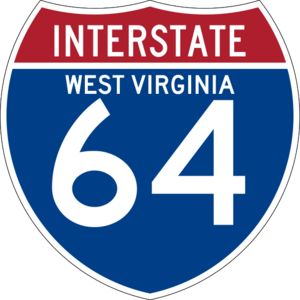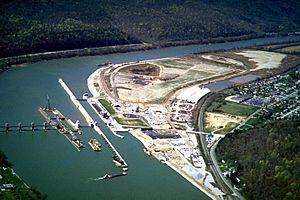Transportation in West Virginia facts for kids
West Virginia is a state with many mountains and rivers, so getting around can be interesting! The West Virginia Department of Transportation (WVDOT) helps manage all the ways people travel. They have over 6,000 employees working to make sure roads, bridges, and other transport systems are safe and working well.
Contents
Roads: Getting Around by Car
Roads are super important for travel in West Virginia. They connect cities, towns, and even remote areas. There are different kinds of roads, each with a special purpose.
What are Interstate Highways?
Interstate Highways are like the main arteries of the country. They are big, multi-lane roads that connect states and major cities. They help people travel long distances quickly and safely. In West Virginia, you'll find several important Interstate highways:
- Interstate 64: This highway crosses the southern part of the state.
- Interstate 68: It connects West Virginia to Maryland.
- Interstate 70: This short section helps connect Wheeling to Ohio.
- Interstate 77: It runs north to south through the state.
- Interstate 79: This highway goes from Charleston up to Pennsylvania.
- Interstate 81: It runs through the Eastern Panhandle.
Some new Interstate highways, like Interstate 73 and Interstate 74, are also being planned for the future.
What are U.S. Highways?
U.S. Highways are another important type of road. They are older than Interstates but still connect many towns and cities, often running through more scenic areas. Some well-known U.S. Highways in West Virginia include:
- U.S. Route 19
- U.S. Route 33
- U.S. Route 50
- U.S. Route 60, also known as the Midland Trail in some parts.
West Virginia State Highways
Besides Interstates and U.S. Highways, West Virginia also has its own system of state highways. These roads connect smaller towns and communities within the state.
Airports: Flying High
Airports are places where airplanes take off and land. They are important for people traveling long distances, either for business or vacation. West Virginia has several airports, including:
- Yeager Airport in Charleston
- Tri-State Airport near Huntington
- Morgantown Municipal Airport
- North Central West Virginia Airport near Clarksburg
These airports help connect West Virginia to other parts of the country and the world.
Railroads: Trains on Tracks
Trains used to be a huge part of transportation in West Virginia, especially for moving coal and timber. However, as cars became more popular, many train tracks were removed. Today, some of these old tracks are even used as trails for hiking and biking!
Passenger Trains Today
Today, two Amtrak train lines serve West Virginia:
- One line goes through the southern part of the state, stopping in cities like Huntington and Charleston.
- Another line travels through the Eastern Panhandle, with stops in Martinsburg and Harpers Ferry.
The Eastern Panhandle also has a special commuter train called MARC's Brunswick commuter rail line. It helps people travel to and from work during the week, ending its journey in Martinsburg.
Freight Trains
Commercial trains still operate in West Virginia, mainly to transport coal. They often carry coal to large inland ports, like the Huntington-Tristate port, which is one of the biggest inland ports in the country!
Bridges and Tunnels: Over and Through Mountains
Because West Virginia is a mountainous state, bridges and tunnels are super important for getting around. They help roads and trains cross rivers, valleys, and even go through mountains!
Some famous bridges and tunnels include:
- New River Gorge Bridge: This amazing bridge is one of the longest single-arch bridges in the world and offers incredible views near Fayetteville.
- Wheeling Suspension Bridge: An old and historic bridge in Wheeling.
- East River Mountain Tunnel: This tunnel goes right through a mountain, connecting West Virginia to Virginia.
Rapid Transit: Quick City Travel
In some cities, there are special ways to get around quickly.
- Morgantown Personal Rapid Transit: Morgantown has a unique system called Personal Rapid Transit. It's like small, automated cars that run on their own tracks, helping students and faculty move around the West Virginia University campus.
Rivers: Waterways for Boats
Rivers have always been important for transportation, especially for moving goods. In West Virginia, several rivers are used by commercial barges, which are large, flat-bottomed boats that carry heavy cargo.
Important Rivers for Barges
- Ohio River: This is a major river that forms part of West Virginia's western border.
- Kanawha River: This river flows into the Ohio River and is also used for barge traffic.
- Monongahela River: This river flows north and joins another river in Pittsburgh, Pennsylvania, to form the Ohio River.
Locks and Dams
To help barges and boats travel safely on rivers, there are special structures called locks and dams. Dams create deeper water for boats, and locks are like water elevators that raise or lower boats to different water levels.
You can find several locks and dams on the Ohio River, Kanawha River, and Monongahela River in West Virginia.
 | Frances Mary Albrier |
 | Whitney Young |
 | Muhammad Ali |



